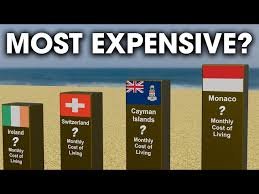Most Expensive Countries in the World: An Insight into Global Living Costs
Introduction: Overview of the Most Expensive Countries
The rising costs of living have become a global concern, with various countries witnessing dramatic increases in the price of everyday goods and services. The latest data reveals that some countries have emerged as the most expensive places to live. Factors such as high real estate prices, transportation costs, and overall inflation contribute to these rankings. This article explores the top countries that have been identified as the most expensive places to live globally and why it matters to students preparing for government exams, especially in subjects related to economics and geography.
Factors Contributing to High Living Costs
Several factors influence the cost of living in a country. Real estate prices, particularly in urban centers, contribute significantly to making a country expensive. Additionally, transportation, food prices, and healthcare services are other major contributors. Countries with strong economies, high standards of living, and limited supply of goods and services often face higher prices. It’s also important to note that political stability and the country’s economic policies play a role in determining the overall cost of living.
Most Expensive Countries in 2024
According to the latest reports, countries like Switzerland, Norway, and Iceland are among the most expensive places to live. Switzerland tops the list due to its high wages, expensive healthcare, and high real estate costs. Norway follows with its high taxes and expensive goods and services, especially in its capital, Oslo. Iceland rounds out the top three with its costly housing and transportation systems. Other countries that rank high include Luxembourg, Japan, and Denmark, each offering high-quality living but with a price tag to match.

Why This News is Important
The news about the most expensive countries in the world provides crucial insights into global economic patterns, which are essential for students preparing for government exams. Here’s why this news is particularly relevant:
Economic Implications
Understanding the most expensive countries is vital in studying global economics. It sheds light on inflation trends, international trade policies, and government strategies to manage economic challenges. Students preparing for government exams should grasp the connection between a country’s economic health and its cost of living, as these concepts are often tested in economics-related questions.
Relevance to International Relations
The cost of living is a reflection of a country’s economic power, political stability, and the overall wellbeing of its citizens. Countries with high living costs often have higher levels of development but may also face challenges such as income inequality. Such topics are critical for exams that focus on international relations, political science, and government policies.
Historical Context: Background Information
Historical Development of Living Costs
Historically, living costs have been influenced by a variety of factors including industrialization, economic reforms, and geopolitical situations. For example, after the Second World War, countries like the United States and Western European nations saw a rise in living standards and costs as they recovered from wartime devastation. On the other hand, countries facing economic difficulties or conflicts saw stagnation or even declines in living conditions.
In the modern era, the cost of living has become a more complex issue due to globalization, technological advances, and the movement of capital and labor. Some countries have experienced rapid economic growth, raising their standard of living and living costs, while others face economic challenges due to high national debt, poor infrastructure, or political instability.
Key Takeaways from “Most Expensive Countries in the World”
| Serial Number | Key Takeaway |
|---|---|
| 1 | Switzerland, Norway, and Iceland are the top three most expensive countries to live in, with high real estate and healthcare costs. |
| 2 | Factors such as high wages, expensive housing, and high taxes contribute to the high living costs in these countries. |
| 3 | Countries with high living costs often have strong economies and a high standard of living, though with notable income inequality. |
| 4 | Understanding global living costs is important for students preparing for exams like UPSC, especially in economics and geography. |
| 5 | The news highlights the link between a country’s cost of living and its political and economic stability, key areas in international relations. |
Important FAQs for Students from this News
What factors contribute to a country being considered expensive?
Countries become expensive due to high costs of living, which are influenced by factors such as real estate prices, wages, transportation, healthcare, and overall economic conditions. Expensive countries often have high-quality infrastructure and services, but these come at a cost.
Which are the top 3 most expensive countries in 2024?
According to recent reports, Switzerland, Norway, and Iceland are the top three most expensive countries to live in, with factors such as high wages, expensive housing, and high standards of living contributing to their costliness.
How does the cost of living affect government policies?
Governments in high-cost countries may need to implement policies to manage inflation, ensure affordable housing, and provide support for lower-income groups. These policies are critical for maintaining economic stability and reducing income inequality.
Why is understanding global living costs important for students?
Understanding global living costs is important for students preparing for exams like UPSC, as it helps them grasp economic concepts such as inflation, international trade, and economic development, all of which are tested in economics and geography-related questions.
What historical factors have shaped the living costs in different countries?
Historical events, such as post-war economic recovery, globalization, and technological advancements, have played a significant role in shaping the living costs of various countries. Economic booms and recessions, along with government policies, have also influenced living costs over time.
Some Important Current Affairs Links


